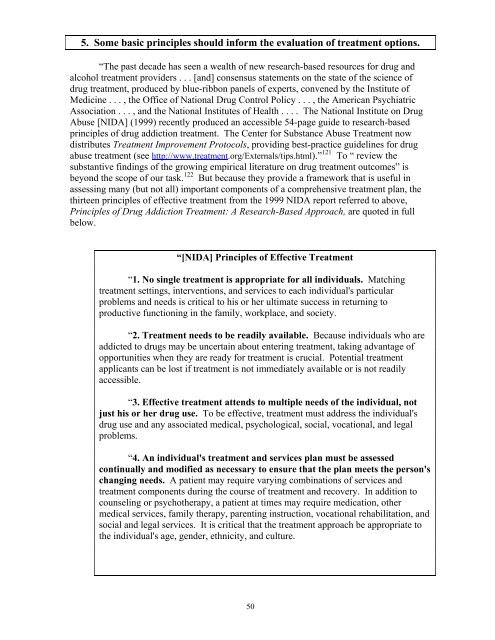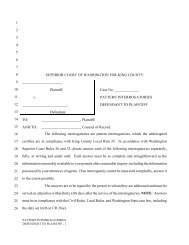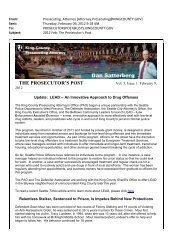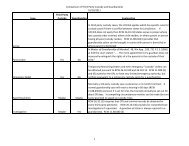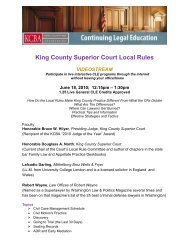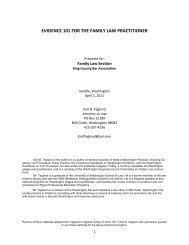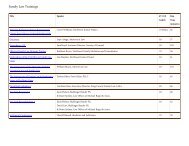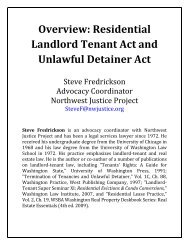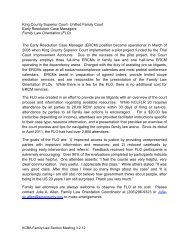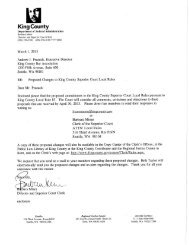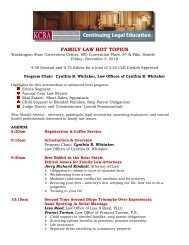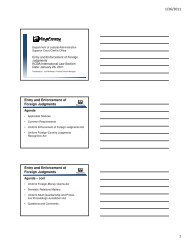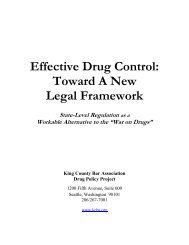Is It Time to End the War on Drugs? - King County Bar Association
Is It Time to End the War on Drugs? - King County Bar Association
Is It Time to End the War on Drugs? - King County Bar Association
Create successful ePaper yourself
Turn your PDF publications into a flip-book with our unique Google optimized e-Paper software.
5. Some basic principles should inform <str<strong>on</strong>g>the</str<strong>on</strong>g> evaluati<strong>on</strong> of treatment opti<strong>on</strong>s.“The past decade has seen a wealth of new research-based resources for drug andalcohol treatment providers . . . [and] c<strong>on</strong>sensus statements <strong>on</strong> <str<strong>on</strong>g>the</str<strong>on</strong>g> state of <str<strong>on</strong>g>the</str<strong>on</strong>g> science ofdrug treatment, produced by blue-ribb<strong>on</strong> panels of experts, c<strong>on</strong>vened by <str<strong>on</strong>g>the</str<strong>on</strong>g> Institute ofMedicine . . . , <str<strong>on</strong>g>the</str<strong>on</strong>g> Office of Nati<strong>on</strong>al Drug C<strong>on</strong>trol Policy . . . , <str<strong>on</strong>g>the</str<strong>on</strong>g> American PsychiatricAssociati<strong>on</strong> . . . , and <str<strong>on</strong>g>the</str<strong>on</strong>g> Nati<strong>on</strong>al Institutes of Health . . . . The Nati<strong>on</strong>al Institute <strong>on</strong> DrugAbuse [NIDA] (1999) recently produced an accessible 54-page guide <str<strong>on</strong>g>to</str<strong>on</strong>g> research-basedprinciples of drug addicti<strong>on</strong> treatment. The Center for Substance Abuse Treatment nowdistributes Treatment Improvement Pro<str<strong>on</strong>g>to</str<strong>on</strong>g>cols, providing best-practice guidelines for drugabuse treatment (see http://www.treatment.org/Externals/tips.html).” 121 To “ review <str<strong>on</strong>g>the</str<strong>on</strong>g>substantive findings of <str<strong>on</strong>g>the</str<strong>on</strong>g> growing empirical literature <strong>on</strong> drug treatment outcomes” isbey<strong>on</strong>d <str<strong>on</strong>g>the</str<strong>on</strong>g> scope of our task. 122 But because <str<strong>on</strong>g>the</str<strong>on</strong>g>y provide a framework that is useful inassessing many (but not all) important comp<strong>on</strong>ents of a comprehensive treatment plan, <str<strong>on</strong>g>the</str<strong>on</strong>g>thirteen principles of effective treatment from <str<strong>on</strong>g>the</str<strong>on</strong>g> 1999 NIDA report referred <str<strong>on</strong>g>to</str<strong>on</strong>g> above,Principles of Drug Addicti<strong>on</strong> Treatment: A Research-Based Approach, are quoted in fullbelow.“[NIDA] Principles of Effective Treatment“1. No single treatment is appropriate for all individuals. Matchingtreatment settings, interventi<strong>on</strong>s, and services <str<strong>on</strong>g>to</str<strong>on</strong>g> each individual's particularproblems and needs is critical <str<strong>on</strong>g>to</str<strong>on</strong>g> his or her ultimate success in returning <str<strong>on</strong>g>to</str<strong>on</strong>g>productive functi<strong>on</strong>ing in <str<strong>on</strong>g>the</str<strong>on</strong>g> family, workplace, and society.“2. Treatment needs <str<strong>on</strong>g>to</str<strong>on</strong>g> be readily available. Because individuals who areaddicted <str<strong>on</strong>g>to</str<strong>on</strong>g> drugs may be uncertain about entering treatment, taking advantage ofopportunities when <str<strong>on</strong>g>the</str<strong>on</strong>g>y are ready for treatment is crucial. Potential treatmentapplicants can be lost if treatment is not immediately available or is not readilyaccessible.“3. Effective treatment attends <str<strong>on</strong>g>to</str<strong>on</strong>g> multiple needs of <str<strong>on</strong>g>the</str<strong>on</strong>g> individual, notjust his or her drug use. To be effective, treatment must address <str<strong>on</strong>g>the</str<strong>on</strong>g> individual'sdrug use and any associated medical, psychological, social, vocati<strong>on</strong>al, and legalproblems.“4. An individual's treatment and services plan must be assessedc<strong>on</strong>tinually and modified as necessary <str<strong>on</strong>g>to</str<strong>on</strong>g> ensure that <str<strong>on</strong>g>the</str<strong>on</strong>g> plan meets <str<strong>on</strong>g>the</str<strong>on</strong>g> pers<strong>on</strong>'schanging needs. A patient may require varying combinati<strong>on</strong>s of services andtreatment comp<strong>on</strong>ents during <str<strong>on</strong>g>the</str<strong>on</strong>g> course of treatment and recovery. In additi<strong>on</strong> <str<strong>on</strong>g>to</str<strong>on</strong>g>counseling or psycho<str<strong>on</strong>g>the</str<strong>on</strong>g>rapy, a patient at times may require medicati<strong>on</strong>, o<str<strong>on</strong>g>the</str<strong>on</strong>g>rmedical services, family <str<strong>on</strong>g>the</str<strong>on</strong>g>rapy, parenting instructi<strong>on</strong>, vocati<strong>on</strong>al rehabilitati<strong>on</strong>, andsocial and legal services. <str<strong>on</strong>g>It</str<strong>on</strong>g> is critical that <str<strong>on</strong>g>the</str<strong>on</strong>g> treatment approach be appropriate <str<strong>on</strong>g>to</str<strong>on</strong>g><str<strong>on</strong>g>the</str<strong>on</strong>g> individual's age, gender, ethnicity, and culture.50


